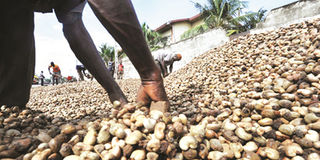Higher prices make cashew nuts leading traditional export

What you need to know:
- The Monthly Economic Review for March 2017 indicated that cashew nuts elbowed tobacco by bringing in $343.6 million (Sh769.6 billion) in the year ending February 2017 up from $184.9 million in the year ending February 2016.
Dar es Salaam. Cashew nuts became the leading traditional export in the year ending February 2017 following bumper harvests and record high prices in the last harvest season.
The Monthly Economic Review for March 2017 indicated that cashew nuts elbowed tobacco by bringing in $343.6 million (Sh769.6 billion) in the year ending February 2017 up from $184.9 million in the year ending February 2016.
In the past few years tobacco has been the leading traditional crop export closely followed by cashew nuts and coffee.
Tobacco exports were worthy $276.3 million in the year ending February 2017 being a slight decline from $276 million in the year ending February 2016.
Coffee was the third largest traditional export bringing in $152.9 million in the year ending February 2017 followed by cotton ($43.8 million), tea ($40.3 million), cloves ($21.5 million) and sisal ($18.2 million).
In total traditional exports were worth $896.7 million in the year ending February 2017 being an increase of 17.8 per cent.
“Much of the improvement came from export of cashew nuts whose value increased on account of both volume and price,” the BoT report says.
By contrast, export value of cloves decreased owing to a fall in both price and volume, while sisal and tea declined on account of a fall in volume as prices increased. Coffee recorded low export value due to a decline in price as volume increased.
Meanwhile the prices of coffee (both Arabica and Robusta coffee) decreased in February due to increase in inventory levels and a favourable outlook for 2017/18 crop-season.
The price of cloves also decreased, largely owing to weak global demand. The prices of tea at Mombasa auction and cotton increased, the former due to dry condition in Kenya and the latter owing to high global demand. The price of sisal remained unchanged.


